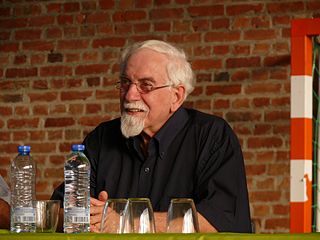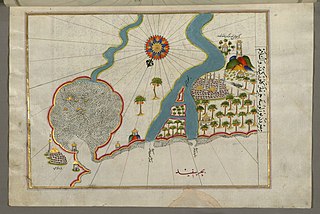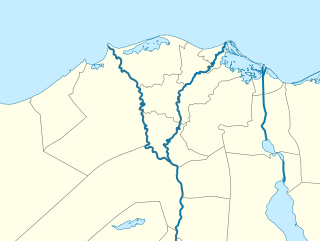Related Research Articles
The holy anointing oil formed an integral part of the ordination of the priesthood and the High Priest as well as in the consecration of the articles of the Tabernacle and subsequent temples in Jerusalem. The primary purpose of anointing with the holy anointing oil was to sanctify, to set the anointed person or object apart as qodesh, or "holy".
The Patrologia Orientalis is an attempt to create a comprehensive collection of the writings by eastern Church Fathers in Syriac, Armenian, Arabic, Coptic, Ge'ez, Georgian, and Slavonic, published with a Latin, English, Italian or mostly French translation. It is designed to complement the comprehensive, influential, and monumental Latin and Greek patrologies published in the 19th century. It began in 1897 as the Patrologia Syriaca, was discontinued in its original form and replaced by the Patrologia Orientalis. The collection began with those liturgical texts that touch on hagiography. Since then critical editions of the Bible, theological works, homilies and letters have been published.

Faqus is a city in the Egyptian governorate of Ash Sharqiyah Governorate. Local attractions include ancient Egyptian monuments in Tell el-Dab'a, Qantir, and Omm Egrim.
ʿAbd al-Jabbar ibn Ahmad ibn ʿAbd al-Jabbar al-Hamadani al-Asadabadi, Abu ʿl-Hasan was a Mu'tazilite theologian, a follower of the Shafi‘i school. Abd al-Jabbar means "servant of the powerful." He was born in Asadabad near Hamadan, Iran. He settled in Baghdad, until he was invited to Rey in 367 AH/978 CE by its governor, Sahib ibn Abbad, a staunch supporter of the Mu'tazila. He was appointed chief Qadi of the province. On the death of ibn 'Abbad, he was deposed and arrested by the ruler, Fakhr al-Dawla, because of a slighting remark made by him about his deceased benefactor. He died later in 415 AH/1025 CE.
Eutychius of Alexandria was the Melkite Patriarch of Alexandria. He is known for being one of the first Christian Egyptian writers to use the Arabic language. His writings include the chronicle Nazm al-Jauhar, also known by its Latin title Eutychii Annales.

Qusta ibn Luqa (820–912) was a Syrian Melkite Christian physician, philosopher, astronomer, mathematician and translator. He was born in Baalbek. Travelling to parts of the Byzantine Empire, he brought back Greek texts and translated them into Arabic.
The History of the Patriarchs of Alexandria is a major historical work of the Coptic Orthodox Church of Alexandria. It is written in Arabic, but draws extensively on Greek and Coptic sources.

Abu al-Aswad al-Du'ali, whose full name is Abū al-Aswad Ẓālim ibn ʿAmr ibn Sufyān ibn Jandal ibn Yamar ibn Hīls ibn Nufātha ibn Adi ibn al-Dīl ibn Bakr, surnamed al-Dīlī, or al-Duwalī, was the poet companion of Ali bin Abu Talib and grammarian. When the great expansion of the Islamic Empire, with millions of newly-converted non-native speakers wishing to read and recite the Qurʾan, made the adoption of a formalised grammar system necessary, tradition honors al-Duʾali as the father of Arabic grammar. His science of grammar led in turn, to the establishment of the first great School of grammarians at Basrah, that would be rivalled only by the school at Kufah. Al-Du'alī is said to have introduced the use of diacritics to writing, and to have written the earliest treatises on Arabic linguistics, and grammar (nahw). He had many students and followers.
Georg Graf was a German Orientalist. One of the most important scholars of Christian-Arabic literature, his 5-volume Geschichte der christlichen arabischen Literatur is the foundational text in the field.

Samir Khalil Samir, is an Egyptian Jesuit priest, Islamic scholar, Orientalist, and Catholic theologian. A professor at the Pontifical Oriental Institute (Rome), at the Centre Sèvres (Paris), at St Joseph University (Beirut), and a visiting professor at many academic institutions.

Bashmur was a region in the Nile Delta in Egypt. In the early Middle Ages, it was inhabited by Christian Copts and was the scene of a series of revolts against Arab rule in the 8th and 9th centuries.
ʿAmr ibn Mattā or Mattai al-Ṭīrhānī was the author of a 14th-century work known as The Book of the Tower. Ibn Matta's work is modelled after, and takes its title from, the Book of the Tower by 12th-century Nestorian writer Mari ibn Suleiman.Ibn Matta's work is discussed in a lengthy entry in the ecclesiastical encyclopedia Miṣbāḥ al-Zulma by Ibn Kabar.
Gaston Wiet was a 20th-century French orientalist.
Muḥammad Abū Numayy II ibn Barakāt ibn Muḥammad was Sharif of Mecca from 1512 to 1566. He co-reigned first with his father (1512–1525) and later with his sons (1540–1566).
Ibrāhīm ibn Muḥammad ibn Ibrāhīm al-Ḥalabī was an Islamic jurist (faqīh) who was born around 1460 in Aleppo, and who died in 1549 in Istanbul. His reputation as one of the most brilliant legists of his time chiefly rests on his work entitled Multaqā al-Abḥur, which became the standard handbook of the Ḥanafī school of Islamic law in the Ottoman Empire.
Abū Shākir ibn al-Rāhib was a Coptic polymath and encyclopaedist from the golden age of Christian literature in Arabic. He is a "towering figure" in Coptic linguistics and made important contributions to Coptic historiography.
The Chronicon orientale is an anonymous universal history written in Arabic by an Egyptian Christian between 1257 and 1260. It was mistakenly attributed to Abū Shākir ibn Buṭrus al-Rāhib in the 17th century, an attribution that has been frequently repeated. Maged Mikhail refers to its author as Pseudo-Abū Shākir, and Adel Sidarus notes that he has often been referred to as Buṭrus (Petrus) ibn al-Rāhib, erroneously combining Abū Shākir's name with that of his father.
Abū al-Faraj ʿAbd Allāh ibn al-Ṭayyib, known by the nisbaal-ʿIrāqī and in medieval Latin as Abulpharagius Abdalla Benattibus, was a prolific writer, priest and polymath of the Church of the East. He practised medicine in Baghdad and wrote in Arabic about medicine, canon law, theology and philosophy. His biblical exegesis remains the most influential written in Arabic and he was an important commentator on Galen and Aristotle. He also produced translations from Syriac into Arabic.
Abu al-Barakat al-Nasafi, was an eminent Hanafi scholar, Qur'an exegete (mufassir), and a Maturidi theologian. He is perhaps best known for his Tafsir Madarik al-Tanzil wa Haqa'iq al-Ta'wil.

Ashmun al-Rumman is a village in the markaz of Dekernes in Dakahlia Governorate, Egypt. Known in classical antiquity as Zmoumis and in the Islamic Middle Ages as Ushmum-Tannah, Ashmun al-Rumman was formerly a major city, serving as a provincial capital.
References
- Eugène Tisserant, Louis Villecourt, Gaston Wiet, Recherches sur la personnalité et la vie d'Abul Barakat Ibn Kubr, Revue de l'Orient chrétien XXII, 1921–22, 373-394.
- Eugène Tisserant, 'Le calendrier d'Abû l-Barakât ', Patrologia Orientalis 49 Paris, Firmin-Didot, 1915, 47-286.
- Samir Khalil Samir (ed.), Mișbâḥ al-ẓulma fī iḑâḥ al-khidma, 2 volumes, Cairo, 1971-1998.
- Samir Khalil Samir, 'L'encyclopédie liturgique d'Ibn Kabar († 1324) et son apologie d'usages coptes', in: H.-J. Feulner, E. Velkovska, R. F. Taft (eds.), Crossroad of Cultures. Studies in liturgy and patristics in honor of Gabriele Winkler (Orientalia Christiana Analecta 260), Rome, 2000, 619-655.
- Wilhelm Riedel (ed.),'Der Katalog der christlichen Schriften in arabischer Sprache von Abū l-Barakāt', Nachrichten der kgl. Gesellschaft der Wissenschaften zu Göttingen, philologisch-hist. Klasse 5 (1902), 635-706.
- Louis Villecourt, Eugène Tisserant, Gaston Wiet (eds.), 'Livre de la lampe des ténèbres et de l'exposition (lumineuse) du service (de l'Église)', Patrologia Orientalis 99, Paris, Firmin-Didot, 1929.